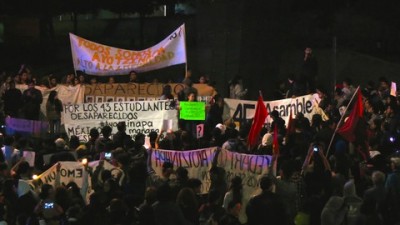Mexican Military Threatens Intervention against Mass Protests

The Mexican state is gripped by a deepening political crisis amidst mass protests over the disappearance and likely massacre of 43 student teachers. The military has threatened to intervene as popular anger mounts against the government and the entire political apparatus.
On Thursday, hundreds of thousands of workers and youth converged on Mexico City’s Zocalo Square. Many of the parents of the normalistas from the Ayotzinapa Rural Normal School took part in the rally, which was held just under two months after the disappearance of their children in late September. Participants denounced the government of President Enrique Peña Nieto, which is complicit in the disappearance of the students and is widely hated for its right-wing, pro-business policies.
The military has responded with ominous warnings about the danger of social “instability.” At a military graduation ceremony Thursday, General Salvador Cienfuegos, Peña Nieto’s defense secretary, alluded to the demonstrations by citing “insecurity” as one of “the great challenges we confront.”
The Army, Cienfuegos declared, “acts with strength and determination when it becomes necessary.” He added, “In times of disunity is when the country has suffered its major fractures.” This is the standard language of a military clique prepared to intervene with force in political life, and the Mexican ruling class has a long history of ordering military attacks on demonstrations.
At the same ceremony, Peña Nieto proclaimed, “Under no circumstances can the loyalty and noble service that the armed forces have lent to the nation be put in doubt.”
Thursday’s demonstrations took place in 30 cities across the country and were the largest since the normalistas disappeared after calling for improvements to rural education. José Luis Abarca, the mayor of Iguala, located in the state of Guerrero, responded to their initial protests by ordering local police to violently attack the student teachers, killing six and abducting 43.
The 43 were subsequently turned over to the notorious and state-connected drug gang, the Guerreros Unidos. Reports have emerged that the normalistas were tortured and then burned alive by members of the cartel.
Demonstrators called for the resignation of Peña Nieto, whose effigy was burned as thousands of onlookers cheered. The main speakers were the parents of the disappeared normalistas, who had traveled over 80 miles from Guerrero to make a national appeal.
“Today, the 20th of November, we celebrate the 104th anniversary of the beginning of the Mexican Revolution,” said Felipe de la Cruz, a father of one of the disappeared. “If we are halted here, it is because the governing class has mutilated our Constitution for their benefit and to justify their acts.”
The government had earlier announced the cancellation of its own Revolution Day parade on account of the expected demonstrations—an act that is itself a significant indication of growing political crisis.
Not only Peña Nieto and his Institutional Revolutionary Party (PRI), but all the major political parties are in one way or another implicated in the massacre. Both the mayor of Iguala (Abarca) and the governor of Guerrero are members of the oppositional PRD, with close ties to drug gangs. The party of Andrés Manuel López Obrador (known as MORENA) backed Abarca and has other ties to officials implicated in the massacre.
All the major parties have also backed Peña Nieto’s “Pact for Mexico,” aimed at introducing free market “reforms” and restructuring the economy to benefit the ruling class and foreign capital.
As the Mexican ruling class prepares to suppress social opposition domestically, it can count on the full support of its counterparts in the United States.
In a February 2014 press conference with President Peña Nieto held in Toluca, Mexico, US President Barack Obama touted “our shared commitment to democratic values and human rights” and praised the “enormous sacrifices” made by the Mexican security forces in the fight against drug cartels.
While the US has remained largely silent about the normalistas, US State Department spokesperson Jen Psaki addressed the Ayotzinapa massacre earlier this month, urging “all parties to remain calm throughout the process,” as though peaceful demonstrators and those responsible for the murder of the normalistas stood on equal ground. Noting that the US government is “concerned about the tensions on the ground,” Psaki added the US was “engaged, also, closely with officials there.” This, no doubt, includes top officials in the Mexican military.
Meanwhile, the United States military and intelligence agencies continue to deepen their already close ties with their Mexican counterparts, under the cover of the “war on drugs.” A report yesterday in the Wall Street Journal noted that officials from the Department of Justice were donning the uniforms of the Mexican Marines and taking part in armed raids in Mexican territory. The US has supplied the Mexican state with some $2 billion in arms aid under the pretext of fighting crime.
Representatives of international finance capital have also responded with concern over the demonstrations. Alfredo Coutiño, the Latin American director of the investment-rating firm Moody’s, said on Friday that, “the political and social events of the last months have begun to generate questions with respect to the promising economic perspectives which were generated with the beginning of the new administration. The markets, above all the international markets, are beginning to be disillusioned…”
The “promising economic perspectives” cited by Moody’s refers above all to the historic privatization of the Mexican oil industry, a move that international finance capital—and the American ruling class in particular—views as a prime money-making opportunity.

